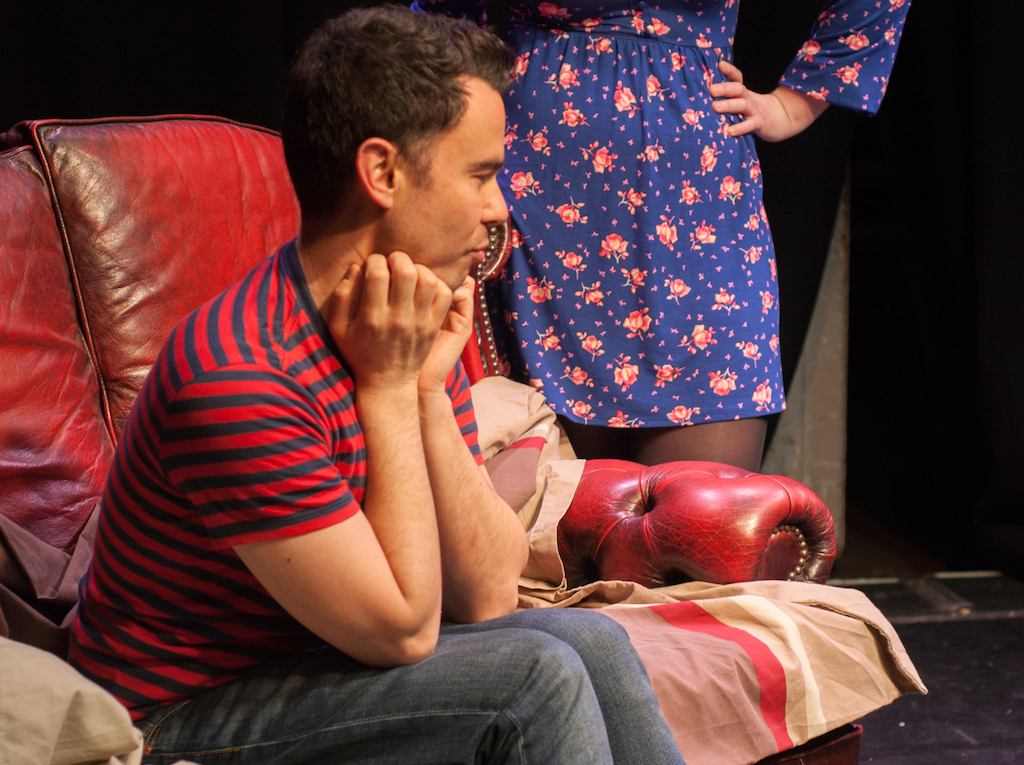Debuting in 2008, Alexi Kaye Campbell‘s The Pride was an exploration of how times and attitudes have changed over the past 50 years within the LGBTQ+ community. Following the lives of Michael, Oliver and Sylvia in both 1958 and 2008, the play charts the hardships that gay men in particular have faced over the years. To celebrate Pride 2018, this cast have come together to tell this story once more.
While the two timelines progress parallel to one another, both are very different in style. The oppressive rigidity of 1950s-society is emulated in Michael Davies’ Philip and his interactions with his wife, Sylvia, and her colleague, Oliver. His serious and restrained nature directly contrasts with 2008 Oliver and his sexual BDSM escapades with a Nazi-dressed escort (hilariously portrayed by director Steve Griffin). While the laughs dominate the 2008 timeline, that is not to say that life is plain-sailing. Along with Oliver’s addiction, The Pride also highlights the assumptions made of gay men in modern-day society, and their struggle for gay relationships to be taken seriously.
In terms of the acting, the performances are best described as uneven. Only so much of Michael Davies’ stiffness can be attributed to his character’s determination to suppress his true sexuality. That said, he is certainly more relaxed as Philip in 2008, though his attire (his ripped white-demin jeans, in particular) does not reflect his shy personality. While Davies does well to distinguish between the two Philips, the same cannot be said for Ian Fallon and his portrayal of the two Olivers. The crass and outrageous personality of 2008 Oliver – a man who struggles to escape his addiction to sexual encounters with strangers – is very different from the gentle children’s writer who is in love with his best friend’s husband. Yet Fallon struggles to keep the two timelines – and two Olivers – separate. As well as the blurring of the two characters, Fallon’s delivery often feels forced and unnatural. This is such a shame when he is performing alongside Louise Sables, who is faultless in her characterisation and performance of both Sylvias. In fact, it is somewhat worrying that a play focused on the LGBTQ+ community is, in this case, carried by the heterosexual woman. Nevertheless, Sables is wonderful in her role as an ally to Oliver, and also as the woman betrayed by her husband and closest confidant. She shines in every scene in which she appears, and her interactions with the other characters are always convincing.
The Pride is an intriguing piece of theatre that details the trials that members of the LGBTQ+ community have suffered over the years. The 1958 timeline faces the horrendous aversion therapy that many men and women faced in an attempt to “cure them” of their attraction towards members of their own sex. It also spotlights the effect having to repress such desires has on couples in the brutal yet brilliantly-handled scene that closes the first act. While the same intensity does not reappear again, the raw moment clearly has a lasting impact on the audience and those involved.
While poignant, the ending does feel abrupt; the final message contained in 1958 Sylvia’s final words do not come across as strongly as they could. Nevertheless, the final moments between Philip and Oliver suggest hope for the future, and round off the play as well as as could be expected. Overall, The Pride is an ambitious play to take on, and the cast have done as well as they could to do it justice.
